Reading, PA (August 25, 2025) – Health and Human Services Program Officer of Berks County Community Foundation, Cindy Milian, gave the keynote speech at the Community Wellness Department of Reading Hospital Tower Health’s “Voices for Health” event. This event launched the Community Wellness Department’s week-long celebration of community health workers. Tanieka Mason, MPH, Director of Health Equity at Tower Health, asked Cindy to address the health needs of Berks County residents, impart her expert knowledge, and provide a testimonial to the vital services our community health workers provide.
Event attendees and speakers included Helping Harvest Fresh Food Bank’s President, Jay Worrall; Reading Hospital President and CEO, Dr. Charles F. Barbera, MD, MBA, MPH, FACEP; Secretary of Human Service of the PA Department of Health, Dr. Valeria Arkoosh, MD, MPH; Executive Deputy Secretary of the PA Department of Health, Kristen Rodack; Senator Judy Schwank; various local health service and pharmaceutical providers, and of course, a cohort of dedicated community health workers who serve Berks County.
According to the Tower Health website, “Reading Hospital’s Community Wellness Department works to identify and address key health issues in the community by leading a variety of programs and initiatives, collaborating with community partners, and investing in the overall health of our community.”
Cindy Milian’s keynote speech for the Community Wellness Department of Reading Hospital Tower Health’s “Voices for Health” event can be found below. Please note that certain photographs and last names of individuals have been omitted to maintain anonymity.
###
“Thank you to the Community Wellness Department of Reading Hospital Tower Health for having me as a speaker for this event.
It is an honor to address esteemed hospital leadership, the stewards and officials of our local community, and of course, the cohort of community health workers present today.
My name is Cindy Milian, and I am the Health and Human Services Program Officer at Berks County Community Foundation. After 25 years of working as an Early Intervention Specialist, Therapeutic Staff Support, Home Health Aide Supervisor, Caseworker, and Casework Supervisor in Pennsylvania, I decided to take a well-deserved break by joining the foundation and overseeing hundreds of grants for individuals, public health initiatives, and human services initiatives.
Before I talk to you about community health, patient advocacy, or social determinants of health, I want to talk about my grandson.
This is Alexander (image omitted). He loves Baby Shark, Reggaeton, and being carried on my husband’s shoulders. If anyone here has a one-year-old child in their lives, then you know that they assert themselves and their needs loudly and with conviction. Alexander is no exception to this—we always know when he’s hungry, or wants Papa, or isn’t feeling well. Being a grandmother to Alexander means witnessing community health initiatives in action; it means fielding a lot of requests for help and hugs; it requires the inspection of the tangible and intangible world around him, and evaluating how it will affect his mental, physical, and spiritual health.
But the real inspection I want to conduct today is on the health of Berks County. My current work with the Community Foundation places me in a position of power and privilege: the power—or burden—of saying no to grant applicants, and the privilege of witnessing the life-changing impacts our donors have on their fellow Berks residents.
With the foundation, I’ve met with Hamburg community leaders who are struggling to identify mental health clinics for their at-risk populations; in Reading, I’ve guided a monolingual, Spanish speaking resident through the process of applying for a grant that could save her child’s life; and all over Berks County,
I’ve talked with countless individuals who are one paycheck away from homelessness. They are our neighbors, our coworkers, our friends. They are the patients we see in our offices, clinics, at-home visits and hospital beds every day.
Before we can talk about community health, we must talk about the community. In 2023, the United Way’s ALICE Report, which stands for Asset Limited, Income Constrained, Employed, showed that over 40% of Berks County households earned less than the county’s basic cost of living. This means that more than 47,000 Berks County working households are one paycheck away from a severe financial crisis, and more than 18,000 households are living in poverty.
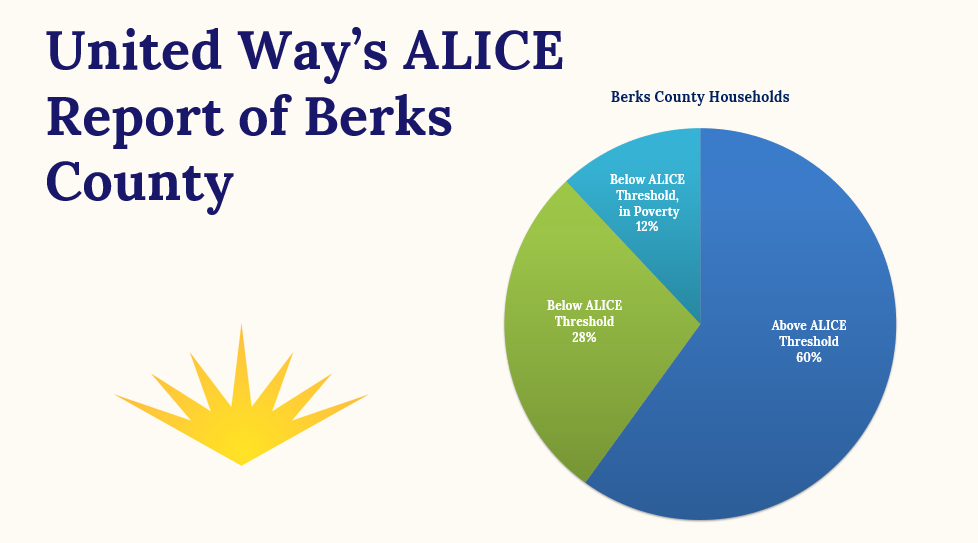
For those 18,000+ households, the cost of a survival budget is unattainable. Meaning 12% of Berks Countians cannot afford the following:
- Housing
- Childcare
- Food
- Transportation
- Health care
- Technology
- Taxes and
- Unanticipated, one-time costs within the other categories.
So, what budget item would you cut to make ends meet? Would you call out from work and miss a paycheck because you couldn’t afford the bus fare? Would you skip a mammogram appointment to pay your rent this month? These aren’t hyperbolic questions designed to scare you – these are questions that tens of thousands of our community members ask themselves every day.
Some people in Berks County might hear these numbers and think, “well, that’s just a City of Reading issue.” This belief is false.
In 2023, the local government released the Study of the Delivery of Health and Public Health Services in Berks County, a comprehensive report that identified four health priorities that are specific to Berks and affect every school district in the county:
- The need to improve access to equitable care, particularly for marginalized populations
- The need to provide behavioral/mental healthcare to both adults and youth
- The need to focus on health education and health literacy, especially resources and information tied to wellness and disease prevention
- The need to address health disparities and increase the focus on health equity
Based on the information provided in this report, I’d like to share with you a story that highlights the need for these improvements. Last names have been omitted to maintain anonymity.

Ms. Susan is a grandmother, just like me. She lives in Boyertown, and, like so many families in our county, has been tasked with the guardianship of her grandson, who was diagnosed with Joubert Syndrome at birth. This genetic disorder affects part of the brain that controls balance and coordination. The disorder requires extensive therapy and services to manage daily living. Missing these appointments can have severe impacts on health – so why would Susan skip them? Ms. Lauren, a community health worker assigned to Susan’s family, noticed a trend of skipped appointments and decided to check in with the family.
Lauren found that Susan’s husband is wheelchair bound and in need of constant care, just like their grandson. Between providing 24/7 care for both her husband and grandson, Susan struggled to manage the paperwork and scheduling necessary for her grandson to attend school and therapy. Lauren discovered that the family didn’t have readily available access to a computer, where most of this paperwork could be found. That’s when Lauren reached out to the foundation.
For less than $200, Jess’s Sunshine Fund provided a laptop for Susan to manage her grandson’s care. The no more missed appointments led to no more unnecessary declines in her grandson’s health. Susan’s grant is one of the smallest distributions made by Jess’s Sunshine Fund, but it was profoundly impactful.
This technological barrier reveals a much larger truth: when we have a dedicated community health worker committed to the recognition, investigation, and improvement of the conditions that people are born, raised, and grow in, we can work together to create a healthier future.
Stories like Susan’s are just one of hundreds that I’ve been a part of at Berks County Community Foundation. Our relationships with community health workers in the county allow us to allocate donor dollars to essential health initiatives.
I’d like to give you another example of how collaboration with a community health worker made a positive impact on a family.
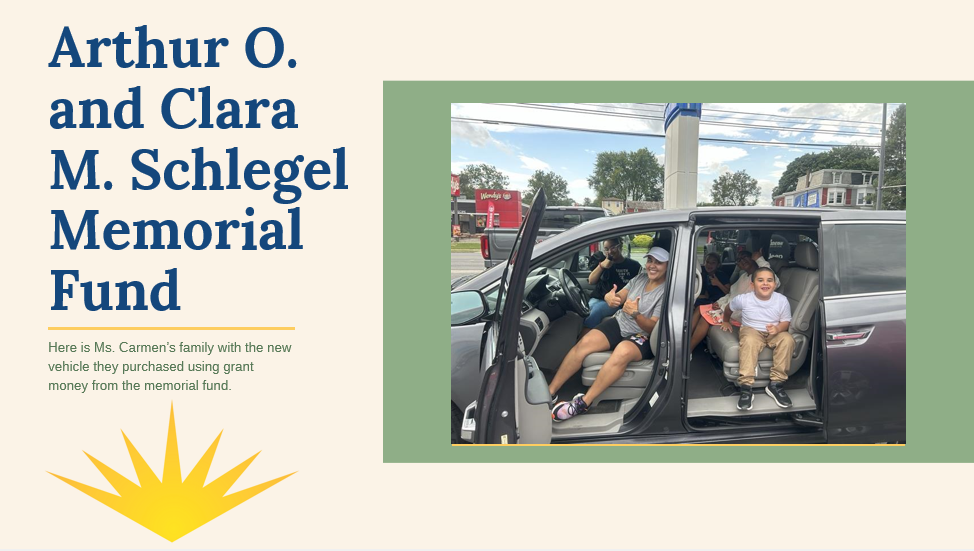
In 2024, a Berks County community health worker, Ms. Bobbi, noticed that Ms. Carmen, whose son has sickle cell anemia and Lowe syndrome, often rescheduled or missed her son’s necessary, recurring appointments in Philadelphia. After talking with Carmen, Bobbi discovered two things: first, Carmen’s car was in constant need of repair and wholly unreliable. Second, Carmen is a single mom, tasked with providing constant care for her son. As a young boy who is blind, non-verbal, and non-ambulatory, Carmen’s son has total dependence on his mother.
With Bobbi’s help and a written letter of recommendation, Carmen applied for our Arthur O. and Clara M. Schlegel Memorial Fund and was awarded the grant money needed to purchase a reliable vehicle. In Carmen’s case, and too often in Berks, non-medical factors impede our community’s health. We’ve all heard the cliché statement of, “I can’t afford to get sick right now.” Right now, it is our job to make a healthy life attainable and affordable for all.
Addressing the social determinants of health in Berks decreases health issues and lessens the burden on our community. Having a community health worker on your care team to identify both non-medical and medical needs is vital to ensuring positive health outcomes.
Berks County is a beautiful, diverse, and complicated region. We speak different languages, experience different life stressors, and hold vastly different beliefs. But our personal health is fundamentally interconnected with our community’s health. We need community health workers in our offices, clinics, hospital rooms, and mobile health services. Now more than ever, for ourselves and for future generations.
In closing, I want to leave you with one final thought. At Berks County Community Foundation, we have a quote on the wall of our boardroom from local philanthropist and industrialist Louis R. Thun; that reads,
“We remind ourselves constantly that we are heirs of an exceptional past, custodians of a challenging present, and architects of a limitless future.”
I believe that together, we can rise to the challenges presented to us today. I believe that we can build a more equitable, healthy, and vivacious Berks County. And to the community health workers of Berks County – thank you. Your work is invaluable and necessary. True change can start with a single spark, and we need yours.
Thank you.”
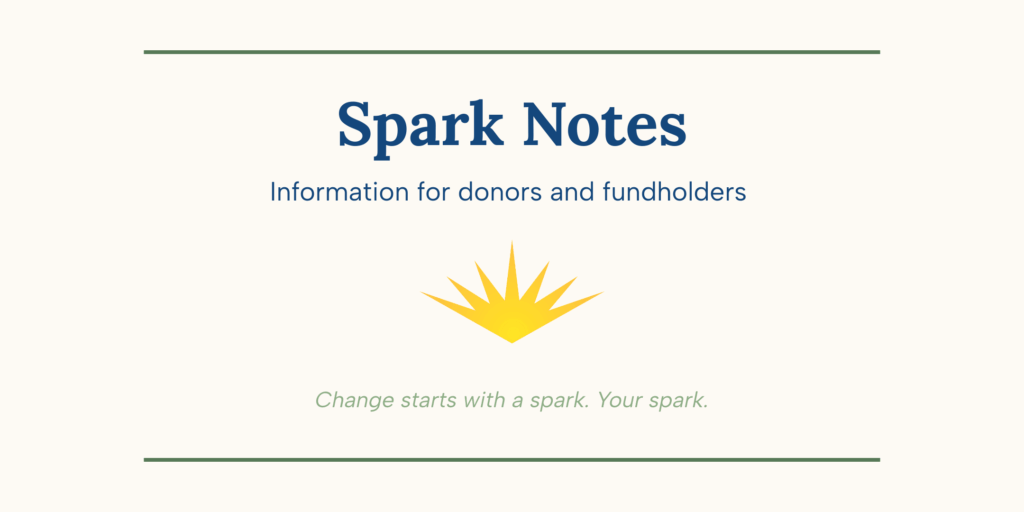
It is our honor to work with so many families and businesses to structure and implement your charitable giving plans.
What’s perhaps most rewarding to the team at the Community Foundation is the overwhelming sentiment among our donors that, despite changes in the tax laws over the years, you are committed to making a difference by supporting the causes you love. Although tax benefits of charitable giving ebb and flow, showing your support for our community and the charities you love through estate planning remains steadfast.
August is National Make-A-Will Month, which means it’s the perfect time to review your estate plans with your attorney and our team at the foundation to ensure your philanthropic intentions are up to date. Even a quick check-in now can maximize the impact of your legacy and help ensure that your wishes are clearly carried out to support the causes you care about for generations to come.
If you are a business owner, the concept of succession/estate planning is nothing new. But succession planning isn’t just for business owners–it’s also important for leaving a charitable legacy. The team at the Community Foundation can help capture your intentions, and we make it easy to involve your family members so that the causes you care about are supported for generations to come.
We look forward to talking with you soon about how you can deepen your involvement with your favorite charities. Our team is here to help.
Ed Lombardo has a connection to Berks County Community Foundation that goes back many years. A lifelong Berks resident, high school football coach, community volunteer and investment advisor, Ed recognizes the importance of philanthropy.
Earlier this year, Ed reflected on his history of giving, which includes the Lombardo Family Scholarship Fund and the Lombardo Family Memorial Fund. To learn more about Ed’s connections to Muhlenburg, read his feature in this year’s edition of our annual magazine, 237 Court. Click here to view the magazine; Ed’s story begins on page 3.
To learn more about establishing a fund at Berks County Community Foundation, click here or email mollyr@bccf.org.
On Tuesday, July 16th, 2025, leaders from Bernville Heritage and Cultural Center, Rentschler Arboretum, Bernville Area Community Library, Friedens Evangelical Lutheran Church and Christ Little Tulpehocken Church welcomed Berks County Community Foundation team members to their spaces to discuss community programming initiatives.
The Foundation visited these institutions, as some have received gifts from various funds the foundation manages, and others simply enrich the cultural, educational, or religious life of the Tulpehocken area.
The program team of Berks County Community Foundation, comprised of experts in their fields of interest, started their Tulpehocken area tour at the Rentschler Arboretum.
The arboretum is a sprawling 34-acre tract of land, pictured below. Blue Mountain Eagle Climbing Club (BMECC), a grantee of Berks County Community Foundation, owns and maintains the arboretum. BMECC leads hikes on the Appalachian Trail, schedules bike rides and camping trips, and hosts various cultural and educational events throughout the year.
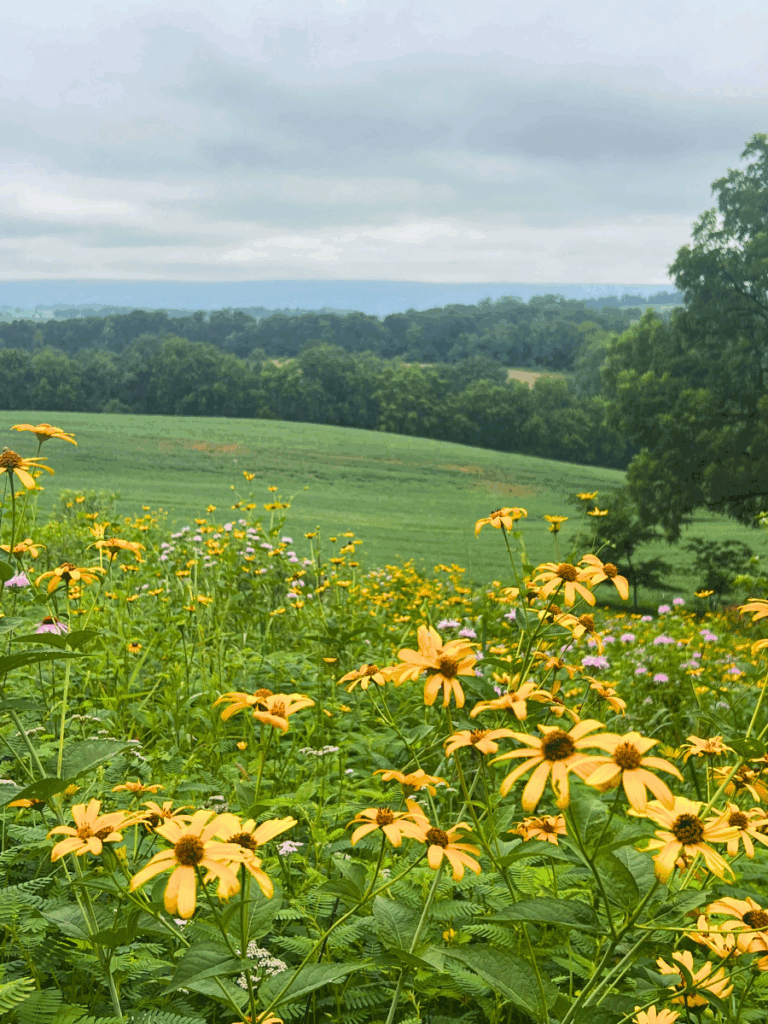
When Berks County Community Foundation staff arrived at the Rentschler Arboretum, Blue Mountain Eagle Climbing Club (BMECC) member Linda Enders greeted the team and led them on a tour of the grounds.
Linda highlighted the club’s non-native flower planting initiative that encourages biodiversity, as well as their kestrel nest box, which helps protect the small falcon’s declining population. A source of pride for the club is its youth camp offerings that allow kids to camp in tents on the Rentschler Arboretum land, learn about environmental protection, and form healthy connections to nature.
A grant from the Conservation Equity Fund of Berks County Community Foundation was awarded to BMECC in 2022. The club used the money to install a new Wayfinding Mural, pictured below.
To learn more about the climbing club and Rentschler Arboretum, visit BMECC’s website.
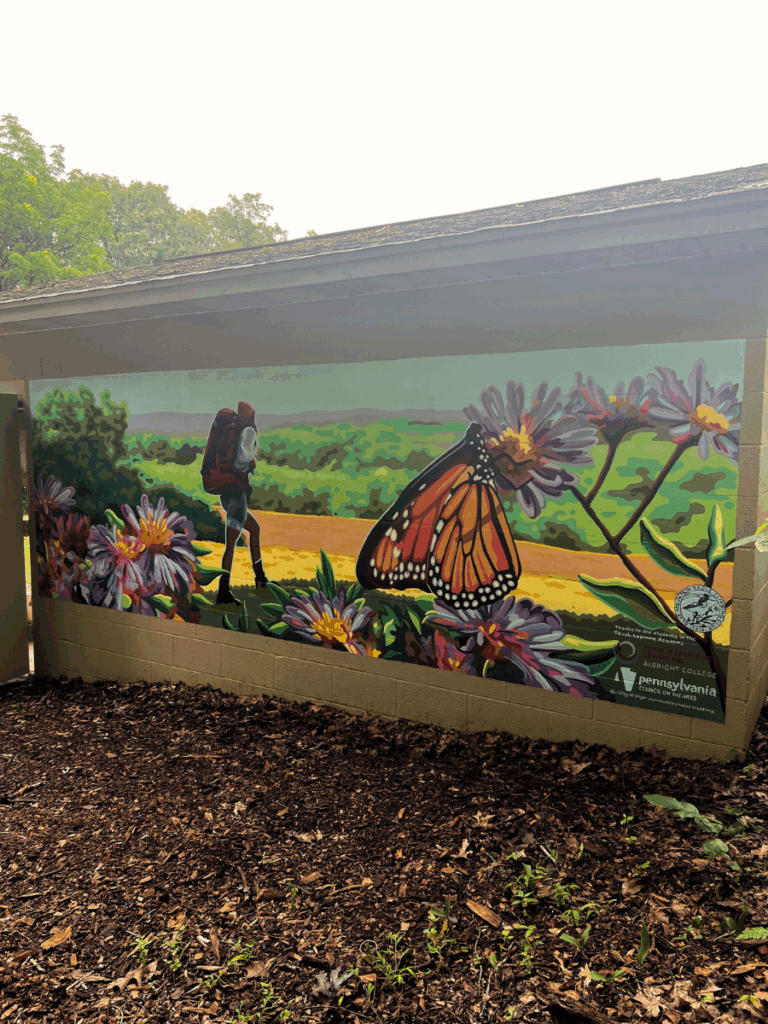
The next stop on the Tulpehocken tour was the Bernville Area Community Library. The director of the library, Jen Franklin, gave a presentation on the library’s history and its position as a vital public institution.
Residents can visit the library for resources beyond books and media. The foyer features a food pantry, the technology section boasts public computers and hotspot rentals, and the library itself hosts over 200 programs each year. Franklin and the library’s website commit to creating a welcoming and safe environment for everyone. To learn more about the programs and resources available at the library, visit their website.
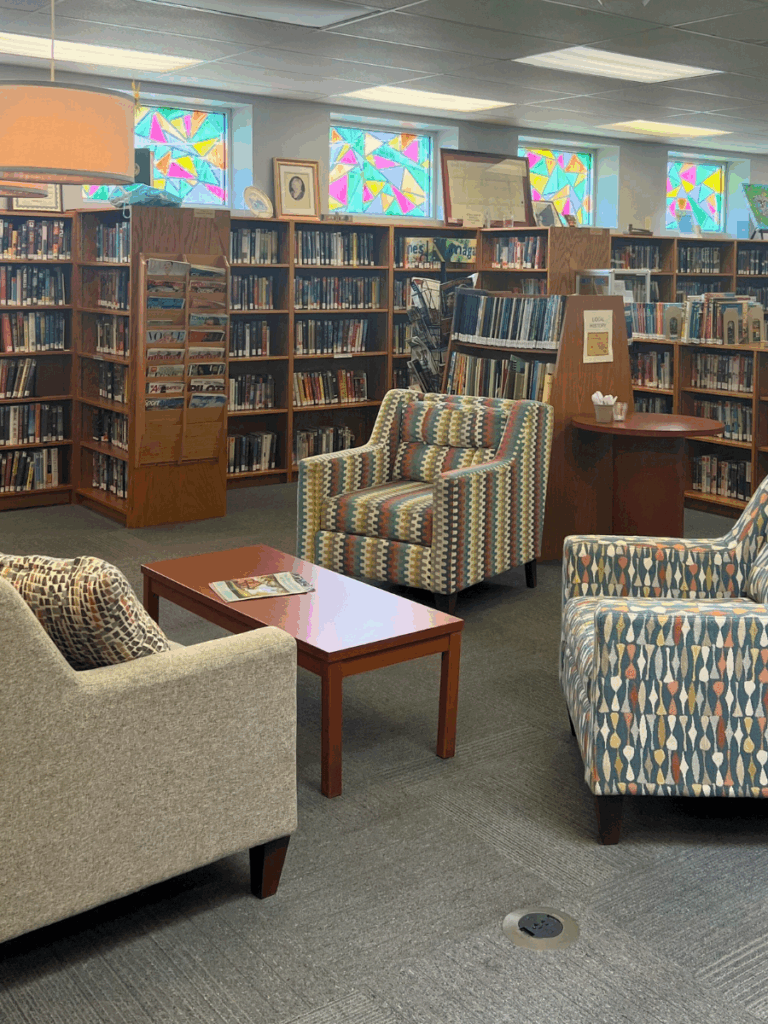
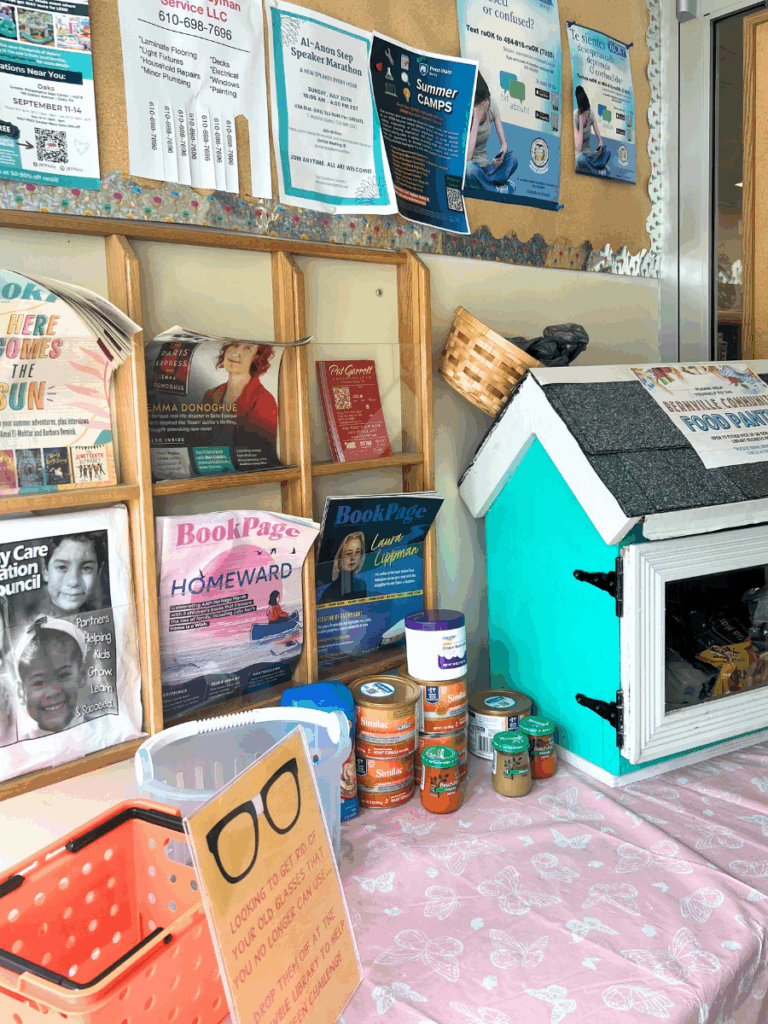
Then, Marisa and Tom Vanzin, members of the Bernville Heritage and Cultural Society, gave a detailed presentation on Bernville’s history. Nestled in rural Berks County, Stephanus Umbenhauer founded Bernville; the borough was officially incorporated in 1851. Stephanus’ children were laid to rest in the Evangelical Lutheran Friedens Church’s graveyard, a historical site in Bernville. Impressive stained-glass windows adorn the inside of the church. Much like Bernville Area Community Library, Friedens Church offers public resources and lends its basement to other organizations to congregate. To learn more about Friedens Church, visit their website.
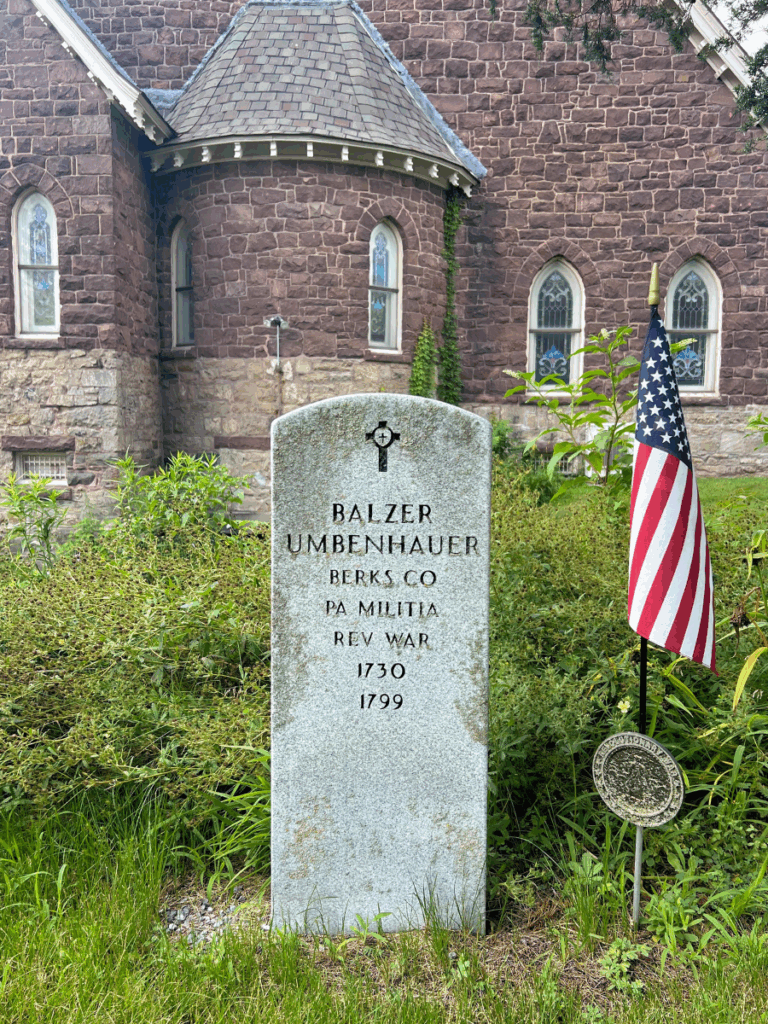
a graveyard holding many Revolutionary War soldiers and notable Berks County residents rest
in the church’s backyard. One such notable soldier is Balzer Umbenhauer, the son of Bernville
founder Stephanus Umbenhauer. Pictured above is Balzer’s final resting place at Friedens Church.

of stained glass.
The Tulpehocken tour concluded at Christ Little Tulpehocken Church, another religious institution that dates to the 18th century.
Despite fire damage and other structural issues, congregants have rebuilt and maintained the historic site for more than 250 years. On the upstairs balcony, a Kantner organ extends to the ceiling. This is where Christ Church member Carol Dieffenbach Kantner played hymns for the foundation and other visitors. To learn more about the storied history of Christ Little Tulpehocken Church, visit their website.
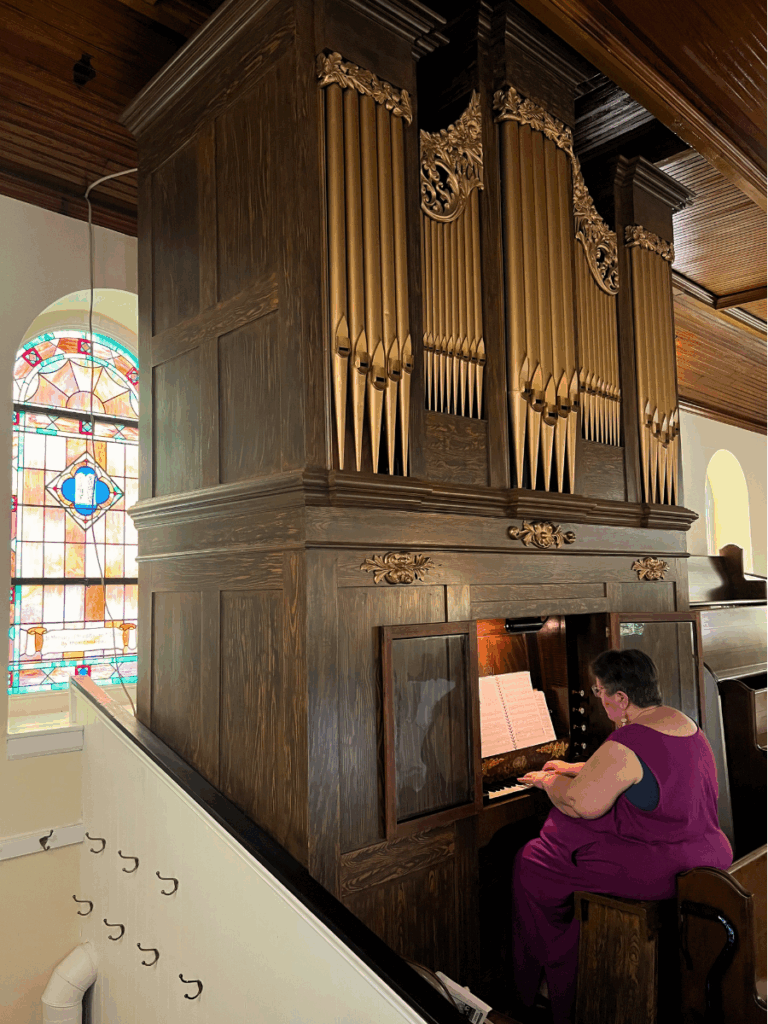
Kantner organs are famous classical instruments, known for their expert craftsmanship and the rigorous preservation efforts.
This Kantner organ moved to Christ Little Tulpehocken Church in 1863.
Berks County Community Foundation extends their gratitude to all the organizations, volunteers, and congregations that hosted us for our first Tulpehocken area tour.
Meeting our community friends and partners strengthens our connections and provides learning opportunities to expand our knowledge of various parts of Berks County.
To learn more about our areas of focus and grantmaking, visit our website: Community Initiatives
###
Have a charitable spark? Create your own fund to put your charitable vision into action.
Reading, PA (July 23, 2025) – Berks County Arts Fund of Berks County Community Foundation recently awarded $50,000.00 in grants to six organizations. The Berks County Arts Fund supports arts and culture organizations that will implement community-focused programs/projects through visual arts. They seek to support innovative, inclusive, and accessible programs that will foster community pride and encourage creative expression within the Berks community.
The following grants were awarded:
- $13,025.70 to Alvernia University’s Total Experience Learning Institute mural project, Sanctuary of Color – Bringing Art to the LightHouse Playground. The mural installation will enhance the beauty, privacy, and safety of the playground for Lighthouse residents who are transitioning from crisis to stability.
- $3,500.00 to Theron Cook Art Don’t Quit Foundation to support the project ArtCycle: Transforming Trash Into Treasure. Guided painting sessions of inner-city Reading’s trash and recycling bins will bring local youth together to beautify their community and learn about the importance of recycling.
- $5,000.00 to State Theatre Preservation Society for its Summer Kid Movies program to provide discounted movies, snacks, and relaxing quality time for lower-income families in Boyertown and the surrounding areas.
- $5,815.00 to Our Town Foundation to build its community mural at State Street Square, an event and gathering space that is currently being developed for the cultural and educational enrichment of Hamburg residents.
- $3,500.00 to Reading Theater Project to construct large, operable puppets for a free, outdoor theater performance at the Reading Public Museum Arboretum.
- $19,159.30 to Reading Symphony Orchestra to host a night of music and visual art. A Visual & Musical Mosaic features musical performances by Reading Symphony Orchestra and photography from local students that answer the question, “What does Berks County mean to me?”
Monica Reyes, Vice President for Programs and Initiatives of Berks County Community Foundation, stated, “We are proud to support these organizations whose work enriches our communities through visual arts. By supporting the visual arts, we’re investing in both creative expression and the civic vitality it fosters.”
###
Berks County Arts Fund supports visual arts programming based in Berks County. To learn more about the fund, please visit the fund’s landing page on our website.
If you would like to make a gift to increase our ability to provide grant funding for the arts in our community, please email Molly McCullough Robbins, Vice President for Philanthropic Services, at mollyr@bccf.org.
Talking is hard – and for girls, having a safe space to discuss feminine issues can make those conversations easier. John Paul II Center created Girl Talk 101 so girls with special needs could meet monthly. There, girls can discuss topics they may not feel comfortable discussing in front of male classmates or at home.
Girl Talk 101 received a grant from the Power of the Purse (POP) in Berks County Fund of Berks County Community Foundation. The grant was awarded so that the club can continue to meet and provide resources for participants. POP awarded the club $3,500 for 2025-2026 to financially support the club’s endeavors. The “girls only” club is available for JPII female students ages 10 to 21 and meets monthly. There, the girls discuss topics like feminine health, personal hygiene, bodily changes, relationships and more. Girl Talk 101 participants also cultivate social skills and self-assurance, so those who can enter the workforce do so with confidence.
John Paul II Center’s mission is to serve “children and adults with intellectual and developmental disabilities by providing diversified programs.” The center believes in the Catholic Church’s teachings on the sanctity of human life, which guides programming. John Paul II Center acknowledges the dignity of all learners while they realize their full potential.
POP is a women’s giving circle established in 2012 to support causes that improve the quality of life for women and children in Berks County. Chiara Sockel Renninger, a financial advisor who had taken part in something similar in Lehigh Valley, brought the idea to the Community Foundation.
“I wanted to start a group that would give local women a place to pool their charitable resources to improve the lives of women and girls in our community,” Renninger said. Since its inception, POP has provided more than $581,000 to local organizations, including JPII for Girl Talk 101.
To learn more about the Power of the Purse Fund of Berks County Community Foundation, please click here.

Tax Law Changes – Time to study up?
Spark Notes will be featured as a blog post each month, providing information relevant to current donors and fundholders and to those who may want to give to the Community Foundation.
The One Big Beautiful Bill Act was signed into law by President Trump on July 4, 2025, after the House of Representatives approved the Senate’s changes to H.R. 1, which passed the House by a narrow margin in May.
The OBBBA, with nearly 900 pages of provisions, reshapes policy across major sectors of the U.S. economy. Included in the OBBBA are several provisions that impact philanthropy. Three major takeaways are of particular importance as the community foundation helps donors, fund holders, and nonprofits–as well as attorneys, CPAs, and financial advisors–navigate charitable planning opportunities over the months and years ahead.
(Notably, the OBBBA omits several provisions that appeared in previous versions of the legislation, such as a proposed increase to the net investment income tax on private foundations.)
Insight #1: Standard deduction goes higher
What’s in the OBBBA?
The new law makes permanent the standard deduction increases under the Tax Cuts and Jobs Act of 2017 (TCJA), increasing the standard deduction for 2025 to $15,750 for single filers and $31,500 to taxpayers who are married and filing jointly. The new law also expands the “bonus” deduction for taxpayers 65 and older through 2028.
What’s more, under the new law, individuals who itemize may take charitable deductions only to the extent the charitable deductions exceed 0.5% of adjusted gross income. Furthermore, taxpayers in the top bracket can only claim a 35 percent tax deduction for charitable gifts instead of the full 37 percent that would otherwise apply to their income tax rate. Note also that the final bill extended the 60% of adjusted gross income contribution limitation for cash gifts made to certain qualifying charities.
What does this mean for charitable giving?
With even fewer taxpayers eligible to itemize, and deductions capped for high-income earners, we’re likely to see a continuation of the chilling effect on charitable giving that occurred in the wake of the TCJA.
What can you do?
If you regularly support charities, it’s important to continue to do so whether or not you’re benefiting from a tax deduction. Our community needs you, now more than ever. If you’re a nonprofit, or if you’re an attorney, CPA, or financial advisor who works with charitable clients, remember that people do not give to charity solely to secure a tax deduction. Keep in mind that many other factors motivate charitable giving, and philanthropy is an important priority for many families. (This article in the Stanford Social Innovation Review has stood the test of time.)
Insight #2: Deduction for non-itemizers
What’s in the OBBBA?
The new law includes a provision, effective after 2025, allowing non-itemizers to take a charitable deduction of $1,000 for single filers and $2,000 for taxpayers who are married and filing jointly. As has been the case in the past, gifts to donor-advised funds are not eligible. Unlike a previous (but smaller) similar provision, though, this law is not set to sunset.
What does this mean for charitable giving?
After the TCJA went into effect, households that itemize deductions dropped to under 10%. Parallel to this trend, the number of U.S. adults who give to charity in any given year has dropped over the last 20 years from nearly two-thirds to less than half, according to some studies. Against this backdrop, the OBBBA’s deduction for non-itemizers has the potential to re-motivate charitable giving among a significant number of households.
What can you do?
For everyone, now is the time to take a serious look at your charitable giving plans to support the causes you care about over the years ahead, especially if you are early in your career and not yet itemizing deductions. If you’ve already established a fund or you’re working with the Community Foundation in another way, please reach out to learn how we can help you make the most of the new tax laws, and even get your children and grandchildren involved. If you’re a nonprofit, now is the time to attract and engage brand new donors. And if you’re an attorney, CPA, or financial advisor, make sure you talk about charitable giving with your clients who don’t itemize; a $1000 or $2000 deduction could be just the motivation they need to begin a journey of philanthropy.
Insight#3: No sunsetting estate tax exemption
What’s in the OBBBA?
For affluent taxpayers updating financial and estate plans, and for the attorneys, CPAs, and wealth managers advising them, the last couple of years have been a roller coaster because of the looming possibility that the TCJA’s increase to the estate tax exemption would sunset at the end of 2025. Finally, there is clarity: Under the OBBBA, the sunset will not happen. The new law makes permanent the increase in the unified credit and generation-skipping transfer tax exemption threshold. The 2025 exemption is $13.99 million for single filers and $27.98 million married filing jointly. In 2026, these numbers increase to $15 million and $30 million respectively.
What does this mean for charitable giving?
Purely estate tax-based incentives to give to charity continue to apply only to the ultra-wealthy, likely resulting in a continuation of the taxpayer behavior triggered by the TCJA. In other words, most people will give to charity during their lifetimes and in their estates for reasons other than a tax deduction.
What can you do?
There is no guarantee that the estate tax exemption will stay high forever. As families work with their tax and estate planning advisors, many are viewing the next two years as an important window to plan ahead. The upshot of the new law is that high net-worth taxpayers now have more time to thoughtfully consider estate planning strategies, including charitable giving. For nonprofit organizations, this means continuing to focus on long-term planned giving strategies is wise.
| The team at the Community Foundation is honored to serve as a resource and sounding board as you build your charitable plans and pursue your philanthropic objectives for making a difference in the community. This newsletter is provided for informational purposes only. It is not intended as legal, accounting, or financial planning advice. Please consult your tax or legal advisor to learn how this information might apply to your own situation. |
Maggie Lewis does not currently live in Berks County, but her connections to home run deep. Maggie grew up here and now returns regularly to participate as a member of the Power of the Purse (POP) women’s giving circle. As a working mother living outside Philadelphia who is busy with her husband and twin toddlers, Maggie makes time to come to Berks County regularly for POP meetings and events, because she believes the mission of POP and the grantmaking facilitated by the Community Foundation is a meaningful way to give back to the community in which she was raised. While she lives in Aston, PA with her family, her connections to her home stay strong.
The Power of the Purse (POP) Fund of Berks County Community Foundation was established in 2012 and currently boasts over 60 members. POP members meet four times per year and attend optional site visits to determine recipients of grant funding through an application and review process. The Community Foundations manages the application and review process.
To read more about Maggie, click here to view the 2025 edition of 237 Court, the official magazine of Berks County Community Foundation. Her donor highlight story is on page 14.
To learn more about the Power of the Purse Fund of Berks County Community Foundation, please click here.
The third issue of 237 Court Magazine is now available! This annual magazine returned to publication in 2024 and will be released each June. This year’s issue features articles about the ways in which the Community Foundation “connects the dots” in Berks County. From connecting donors to options for giving – to connecting students to engaging experiences and learning opportunities – to connecting leaders to each other in an effort to share resources, this magazine issue shines a light on the grantmaking and initiative work of Berks County Community Foundation. Click here to read the 2025 issue of 237 Court Magazine!
Visit our News and Events page to stay up to date on Berks County Community Foundation.
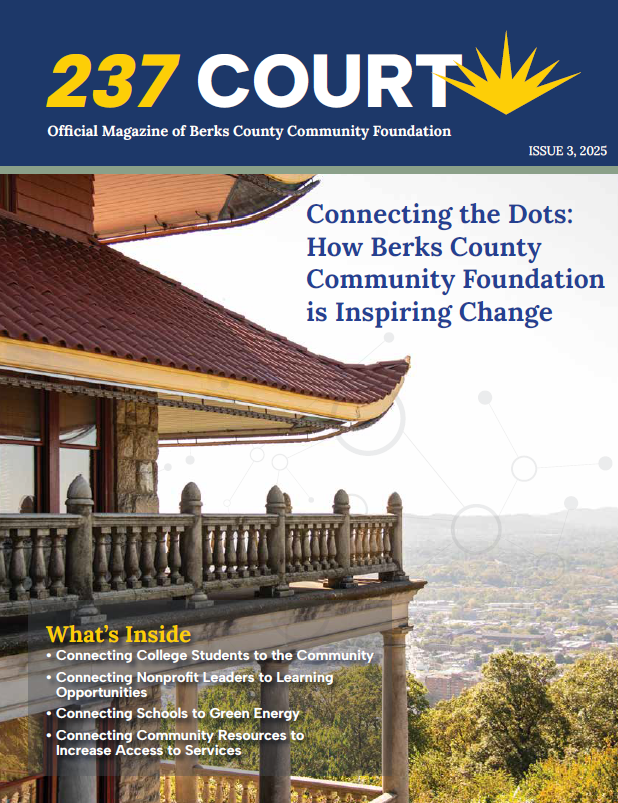
Reading, PA (June 23, 2025) – Berks County Community Foundation granted $102,500 to support 10 local projects that will address critical environmental challenges, promote sustainable practices, and build collaborative partnerships. Grants were made from the Innovation Fund of Berks County Community Foundation, which supports projects that improve environmental health and climate resiliency in Berks County.
The 2025 grants include:
- $1,000 to Albany Township for community park improvements
- $6,000 to the Berks Recycling Coalition to support the Berks County Earth Day event
- $15,000 to Berks Nature to support municipal outreach and collaboration
- $12,500 to Berks Nature for planning and restoration work with watershed associations
- $5,000 to the Borough of Lyons for stream restoration planning at Lyons Borough Park
- $15,000 Delaware Riverkeeper Network to support environmental leadership development
- $12,000 to PennEnvironment Research and Policy Center to support clean energy work in Berks County
- $12,000 to Student Conservation Association for the Reading Conservation Corps
- $12,000 to What’SUP Berks Initiative to reduce single use plastics throughout Berks County
- $12,000 to Widoktadwen Center for Native Knowledge to build an indigenous ecological education garden
“These grants will deliver vital support for local initiatives tackling urgent environmental issues, advancing sustainable solutions, and strengthening our community’s ability to adapt to the growing impacts of climate change,” said Emily Smedley, Environment and Energy Program Officer at Berks County Community Foundation.
To learn more about The Innovation Fund, please visit https://bccf.org/funds/the-innovation-fund/.


